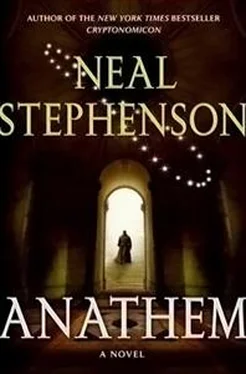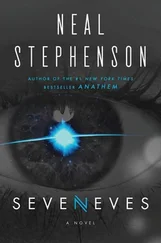“Those guys,” he said.
“Those guys,” I affirmed.
“The Lineage?”
“Not exactly the Lineage—since that goes all the way back to the time of Metekoranes—but a kind of Sæcular incarnation of it, a dowment that was established and funded around the time of the Third Sack. Tied into the mathic world in all sorts of ways. Owns Ecba and Elkhazg and probably other places besides.”
“Maybe it looks that way to you,” Emman said, “but I can promise you that most of what you call the Panjandrums have never heard of this dowment. It is nothing to them—exerts no influence. Magnath Foral—if they’ve heard his name at all—is just a dried-up, blue-blooded art collector.”
“But that’s how it would happen,” I said. “They would set this thing up after the Third Sack. It would be famous and influential for about ten minutes. But after a few wars, revolutions, and Dark Ages, it would be forgotten. It would become what it is.”
“And what is it?” Emman asked me.
“I’m still trying to figure that out,” I said. “But I think that what I’m saying is that—”
“We Sæculars are in over our heads here?” Emman suggested. “I’m comfortable with you saying that.”
“But are you comfortable with the practical consequence,” I asked him, “which is—”
“That if I get the order,” he said, with a flick of the eyes at the place where I’d secreted the Everything Killers, “maybe I should ignore it, because it was issued by a clueless Sæcular who has been working from the wrong Narrative?”
“Exactly,” I said. And I noticed him rubbing his jeejah with his thumb. He had gotten a new jeejah since Tredegarh. Most unusual. From hanging around with Cord, I knew some of the terminology: Emman’s jeejah had been milled from a solid billet of alloy, not molded in poly or stamped out of sheet material. Very expensive. Not mass-produced.
“Nice, huh?” He’d caught me looking.
“I’ve seen one before,” I said.
“Where?” he asked sharply.
“Jad had one.”
“How could you know that? It was issued to him immediately before the launch. He burned up before you could talk to him.”
I just stared at him, hardly knowing where to begin.
“Is this one of those in-over-my-head things?” he asked.
“More or less. Tell me, how many more of those things?”
“Up here? At least one.” And he turned his head toward the inflatable. The outer door of its airlock had been unzipped, and a series of men and women in impressive clothes were emerging, patting their heads self-consciously as they got used to the feel of their nose-tubes. “The third one—the bald man—has one just like it.”
My right arm departed the conversation. Ala had made off with it. The rest of me caught up just in time to avoid dislocation of the shoulder joint. “You should wear your earbud,” she told me, “then you’d know we’re in the middle of an aut!” She slapped a bud into my hand and I wormed it into my ear. Music had begun to play from a band on the other side of the ellipse. I looked across and saw four long boxes—coffins—being borne down to the water’s edge by a mixed contingent of Urnudan, Troan, Laterran, and Fthosian soldiers.
Ala led me round behind the inflatable, where Arsibalt, Jesry, and Lio were standing at three corners of another coffin. “For once, I’m not the latest!” Lio said wonderingly.
“Leadership has changed you,” I said, and reported to my corner. We picked up the coffin, which I knew must contain the remains of Lise.
All of these coffins smacked me into a whole different frame of mind. We carried Lise out from behind the inflatable, centered her in the road that led to the water’s edge, and set her down as we waited for the procession on the opposite side to finish. The music, of course, sounded strange to our ears, but no stranger than a lot of stuff you might hear on Arbre. Music, it seemed, was one of those places where the Hylaean Flow was especially strong—composers in different cosmi were hearing the same things in their heads. It was a funeral march. Very slow and grim. Hard to say whether this was a reflection of Urnudan culture, or a sort of reminder that the four in those coffins had slain a lot of Geometers and that we’d best keep that in mind before we got to celebrating them.
It almost worked. I actually started to feel guilty for having delivered the Valers to the Daban Urnud . Then I happened to glance down at the coffin beside my knee, and wondered who up here had shot Jules’s wife in the back. Who had given the order to rod Ecba? Who was responsible for killing Orolo? Was he or she standing around this pool? Not the sorts of things I should have been thinking at a peace conference. But there wouldn’t have been a need for one if we hadn’t been killing each other.
The soldiers carried the coffins of Osa, Esma, Vay, and Gratho quite slowly, stopping for a few beats after each pace. My mind wandered, as it always did during long auts, and I found myself thinking about those four Valers, recalling my first impressions of them in Mahsht, when I’d been cornered, and hadn’t understood, yet, what they were. The scenes played in my head like speelies: Osa, perched one-legged atop the sphere that sheltered me, fending off attackers with snap-kicks. Esma dancing across the plaza toward the sniper while Gratho made his body into a bullet-shield for me. Vay fixing me up afterwards—so efficiently, so ruthlessly that snot had run out of my nose and tears from my eyes.
Were doing so, for I was weeping now. Trying to imagine their last moments. Especially Suur Vay, out on the icosahedron, in single combat against several terrified men with cutting tools. Alone, in the dark, the blue face of Arbre thousands of miles away, knowing in the last moments she’d never breathe its air again, never hear the thousand brooks of the Ringing Vale.
“Raz?” It was Ala’s voice. She had her hand—more gently, this time—on my elbow. I wiped my face dry with my bolt, got a moment’s clear view before things got all misty again. The honor guard across the pool had set the Valers’ coffins down and were standing there expectantly. “Time to go,” Ala said. Lio, Jesry, and Arsibalt were all looking at me, all crying too. We all bent our knees, got a grip on the coffin, raised it off the deck.
“Sing something,” Ala suggested. We looked at her helplessly until she said the name of a chant that we used for the aut of Requiem at Edhar. Arsibalt started it, giving us the pitch in his clear tenor, and we all joined in with our parts. We all had to do some improvising, but few noticed and none cared. As we came out in view of the Laterran pavilion, Jules Verne Durand went off the air. I glanced up through the windows of the translators’ booth and saw other Laterrans rushing to his side to lay hands on him. We all sang louder.
“So much for the Orth translation,” Jesry said, once we had reached the water and set Lise down. But he said it in a simple and plaintive way that did not make me want to hurt him.
“It’s okay,” Lio said, “that’s the good thing about an aut. The words don’t matter.” And he rested his hand absent-mindedly on the lid of the coffin.
The soldiers on the opposite bank transferred the coffins of the Valers onto a sort of flatboat. They could simply have marched them around to us, but there seemed to be something in the act of crossing the water that was of ceremonial meaning here. “I get it,” Arsibalt said, “it represents the cosmos. The gulf between us.” There was more music. The raft was staffed by four women in robes, who began rowing it across. The music was much easier on the ears than the funeral march: different instruments with softer tones, and a solo by a Laterran woman who stood at the edge of the water and seemed to make the whole orb resonate with the power of her voice. It was a good going-home piece, I reckoned.
Читать дальше





